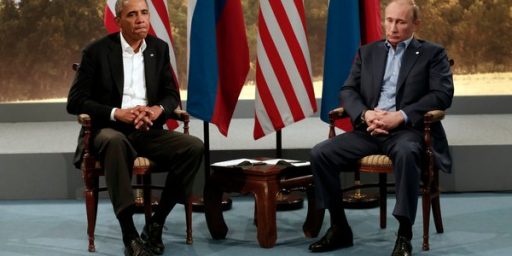Why the U. S. Will Intervene Militarily in Syria
Dave Schuler
·
Wednesday, June 12, 2013
·
34 comments
Writing in Foreign Policy, Aaron David Miller outlines why the United States will ultimately and despite all of the arguments against it intervene militarily in Syria. His argument, essentially, has three points:
- Time’s starting to run out
- No diplomatic track in sight
- The ascendance of the liberal interventionists in the Obama
Read the whole thing.
For what it’s worth, the Russians have maintained from day one that the humanitarian position with respect to Syria was backing Assad.

About Dave Schuler
Over the years Dave Schuler has worked as a martial arts instructor, a handyman, a musician, a cook, and a translator. He's owned his own company for the last thirty years and has a post-graduate degree in his field. He comes from a family of politicians, teachers, and vaudeville entertainers. All-in-all a pretty good preparation for blogging. He has contributed to OTB since November 2006 but mostly writes at his own blog,
The Glittering Eye, which he started in March 2004.






Forget Benghazi, this is the real reason I distrust Power and Rice.
pl. refer previous experience of america about vietnam, panama, afghanistan, iraq . breaking the resistance of sovereign state killing the civilians and assassination of the leaders is not right way. this is the thing terrorist is also doing. who ever the terrorist in the world they all created by USA, better example is OSAMA BIN LADEN they create they destroy. ideally say as a power full country like USA should be lead for everyone , but here Mc Cain ( a third rate airforce pilot) bullshit is posing with terrorist , those terrorist don’t know when there heart beats is going to stop. this are all happening because of OBAMA . HE IS NOT THE RIGHT PERSON FOR AMERICAN PRESIDENT . according to his exposure he is talented only to be trade union leader for some third rate african nation.
So you voted for Mittens???
Maybe I’m crazy, but isn’t the fact we can’t really think of a way it might end well a reason NOT to get involved in Syria?
@Stormy Dragon: Maybe I’m crazy, but isn’t the fact we can’t really think of a way it might end well a reason NOT to get involved in Syria?
I think so, yes. Miller’s case is built around pressure from the commentariat forcing America’s hand. I think (hope) we’re past that.
If Obama resists the pressure to intervene, he will have done much more than many recent presidents.
@rudderpedals:
Exactly. Miller’s setup reads like parody. Everything old is new again..
I don’t see what recommends this piece of shallow analysis. Its thesis is that Obama will disregard what he thinks is the prudent thing to do, and instead wade into an extremely risky endeavor to establish a “legacy” based on the predicted beliefs of commenters examining his presidency after he’s left office. Come on. Does Obama do anything without an expectation of a real payoff? No. Does he take great risks to please critics? No. He ran for office on the idea that he’s ending American military interventions in the middle east, not starting them. So why would he change his behavior now?
Okay, let’s put that to one side, and assume Obama wants to play to some future audience and concludes that “winning” Syria is key. What’s his strategy? Israel isn’t clamoring for intervention to oust Assad, because they’re apparently more comfortable with the devil they know. They’ve only intervened to stop weapons flowing to Lebanon. The Russians have a lot invested in the Iran-Syria-Hezbollah relationship; even if their threat of sending S-300s has been bluster so far, they could send them and then the idea of relatively costless American air supremacy – which is the way we like to roll – is out the window.
That leaves us the prospect of losing a lot of U.S. pilots and aircraft (if we commit forces) or confining ourselves to sending lots of lethal aid to the rebels. But which rebels? The ones we like best are not the best fighters – the jihadists are. Even if we pick one faction to support, how do we stop other players from arming the other factions? How do we stop the jihadists from taking or buying the weapons we send to our preferred faction?
Okay, put all that to one side. Forget that Israel doesn’t want us to intervene, forget that Russia would oppose us, forget that we can’t prevent really bad people from becoming the strongest force among the rebels. Let’s just assume we “win” and topple Assad, and the rebels come to power. What are the consequences? A big defeat for Hezbollah and the Iranians and their Russian patron. Yay. But also probably a radical Sunni regime running Syria and a wider regional war between Sunni and Shia. Not so yay.
Does anyone expect this President to make that kind of move?
@Dave Schuler
I did, and it is mostly tripe. As you have noted many times, Americans do not care about foreign affairs. They are never going to blame President Clinton for not intervening in Rwanda, and if President Obama sits out Syria, nobody is going to care.
The author details the reasons intervention is useless. He then predicts President Obama will intervene because of history. Finally, he concludes without detailing how President Obama will be able to overcome the reasons intervention is useless.
I think the biggest reason for Obama intervening is the hard “national security” reason that not intervening probably means a victory for Iran-an Iran that aspires to be a nuclear power and who is increasingly interventionist abroad.
Doug’s view that intervention in Syria can only be justified on humanitarian grounds is wrong, IMO. That doesn’t mean that our current options are good. But it does mean that we should be trying to find better options.
The legacy argument is an interesting one in the wake of Libya.
Considering the fallout from Libya, I don’t think Obama’s itching for another go.
@Tillman:
Let’s stipulate that Obama (and IMO, Rice and Powers) don’t want to intervene. They also don’t want a stronger and more warlike Iran in the Middle East, either. The non-interventionists may down vote me for this, but an Assad victory would represent a strategic defeat for the US. Now maybe its a defeat we can live with. We don’t have to win all the time. But the bitter truth is that it will be a defeat.
Libya was a net victory for us, so I think the Obama Administration is satisfied with the Libya outcome.
For Assad, Hezbollah, and Iran victory over the Syrian rebels is a matter of survival. Losing Assad as an ally would be a serious set-back for Russia’s Middle Eastern foreign policy strategy.
The stakes are significantly lower for us. I don’t think an Assad victory would be a strategic defeat for the U. S. so much as the lack of a strategic victory. Is there a strategic victory for us to be had in Syria? I’m skeptical. At this point it looks a lot like a choice between the status quo ante and prolonged civil war in Syria, possibly spreading to Lebanon, Turkey, Jordan, and Iraq.
How would either of those outcomes be a strategic victory for us?
@Dave Schuler:
Yes, there is. It’s what the Obama Administration was hoping for at the start of the conflict-the emergence of a moderate, pro-Western regime in Syria, a la Tunisia and (with Western help) Syria. That did not happen because Assad (who was thought to be weak and vacillating) proved to be ruthless about crushing the rebels, and so war came.
Not only was Assad ruthless, but his foreign allies went all in on military support, whereas the West stood aside and the Gulf supported only the jihadists.Not surprisingly, the moderate option withered while this became a war between Assad and the jihadists-a war that looks likely now to result in an Assad victory-a result unforeseen by non-interventionists who are trying to come to terms with what definitely would look to the rest of the world as a defeat for the West.
Now is there a possibility for a Western strategic victory?Only if we could develop a moderate opposition option. That would now be definitely a matter of farming, not choosing. We could meet with moderates and sow some seeds- secretly of course, with idea that a moderate armed opposition would emerge over time. There may not even time enough for this to work, because Assad might close this thing out fairly quickly now.
It’s what the Obama Administration was hoping for at the start of the conflict-the emergence of a moderate, pro-Western regime in Syria
“And a pony.”
Iran has no interest in Syria’s becoming “a moderate, pro-Western regime in Syria, a la Tunisia.” Neither does Russia. Quite the opposite.
@stonetools:
Tunisia is not even close to Syria. Libya is somewhat comparable with Syria, but even that is a stretch. In any case, I do not see democracy flowering in the Middle East region. I expect this to be a lull between bad guys.
I think you seriously underestimate the impact of Russia’s non-involvement. Libya was fast and easy because the Russians and the Chinese did not interfere. The Chinese alone were a non-entity, but they could bolster Russian interference.
Many in the West disregard Russia’s capabilities, and they seriously underestimate Vladimir Putin. The Russian Bear has been in hibernation since the fall of the USSR. The hibernation is over, and Western nations would be well advised to not disdain Russia.
@TastyBits:
Agreed. And come to think of it, Americans should come to grips with the prospect that Iran is a rising regional power due to its political strength among Shia. We can label them bad guys and, guess what, they are. But you can’t deal with a strategic political threat by using military force alone.
Also, people have watched what has happened in Iraq and Afghanistan and drawn the appropriate lessons, even if the American public and much of the political class hasn’t: George W. Bush has effectively precluded us from threatening large-scale military intervention again for a generation. How would we pay for it? Which military commanders would recommend it? Which voting constituency would be in favor of it?
Preventing the Iranians from developing nuclear weapons (assuming that we can) won’t do much to contain their influence. As you say, we would be better served by seriously talking to the Russians about their interests in the region rather than blowing them off or assuming our military will be sufficient to protect our own interests. For that matter, we’d be better off if we did the same with the Israelis, Iranians, Egyptians, Saudis, and everyone else involved.
@Anderson:
Indeed. Which is why Russia and Iran went all in on backing their preferred outcome, an Assad victory. They didn’t hope-they acted to ensure the desired result. There may be a lesson in that.
@TastyBits:
Fatalism and doing nothing has always had its admirers. It’s also possible that democracy can succeed. Eastern Europe looked hopeless for democracy in 1988, too.
@stonetools:
But you’re not responding to the major rebuttal to your argument: Propping up Assad doesn’t “win” Iran anything, it only maintains the status quo.
And I don’t think anyone should downvote your argument based on your conclusion; if you can support it based on evidence, I’m all ears.
@stonetools:
In what way? When Assad had total control of his country, it’s not as if we were benefiting somehow from it. Syria has gone from a pawn in someone else’s chess set to a quagmire that could damage allies and other strategic assets. Getting involved militarily seems like an even worse idea, if only because we’d be doubling down on a highly uncertain gamble.
If the war threatens to spread to Turkey or Jordan, then we have a good case. Otherwise, I don’t see it.
Also, Iran’s ascendance is severely hampered by the sanction regime. The elections about to take place have drawn focus to this, and how horribly their economy has been handicapped. They can be a voice, but they can’t lend much more than that.
@David D. from Philly:
As I said above, its possible for the US to live with a more powerful, belligerent Iran and renewed Russian influence in the region-the result of an Assad victory. But let’s not pretend it’s not a strategic defeat or that things would be better for us and our Middle Eastern allies if Assad wins .
There’s living with the consequences of a defeat and then there’s willful blindness.
@stonetools:
But you’re still just asserting the conclusion. How does Assad surviving increase Iran’s power? Clearly, Assad being deposed would be a defeat for Iran and Russia, but that doesn’t make the opposite outcome a victory.
@Tillman:
First, if Assad wins, there’s be no question that he will be beholden to Iran and the Russians in a way that he wasn’t before. Pipeline projects from Iran , Russia and Azerbaijan are going to be green-lighted: pipelines from the Gulf States won’t be.
The flow of arms to Hezbollah will continue and even increase, and Syria may become a second front in Hezbollah’s contest with Israel. Advanced Russian weaponry and missiles may now menace Israel.And so on.
Remember, the West’s original hope during the Arab Spring was for the overthrow of Assad,the establishment of a moderate, pro-Western regime and the further isolation of Iran. The failure of that hope is undeniably a setback for the West. Now, if you say we can live with that, OK. But let’s not pretend an Assad victory is optimal or doesn’t matter.
@David D. from Philly:
I think you’re defining victory away here. Regardless of what you think, the rest of the world would certainly view it as a victory-and it would open things up for other moves by Iran- moves that would not happen if Assad lost.
@stonetools:
I don’t care about perceptions, just reality. There is a matrix of outcomes: Assad could lose and be deposed, and we could win and help install a pro-US government in Syria. Assad could lose and we could lose if a radical Sunni government takes over Syria. We could all lose if a wider Sunni-Shia civil war breaks out. Assad could win and we could lose in the form of, as you put it above, Iranian and Russian economic interests being strengthened in the form of pipeline deals made with Assad. Okay, let’s examine that.
Didn’t Syria already have a deal with Iraq to build a pipeline through which Russian and Iranian oil and gas could be transported? You might say, yes, and it is in our interest to prevent it from being built. I just don’t see that as a clear reason for us to go all in. No matter who is in charge of the country, their economic interest is going to lie in trans-shipment of oil and gas that’s going to originate in Iraq, at least. We have no control over how a post-Assad Syria would break in terms of economic alliances. I understand that Turkey, Qatar, the Kurds, and everyone else is jockeying for their particular optimal outcome, and while that outcome is important to the U.S., it’s not worth dropping another $1 trillion on, like we did with Iraq.
@David D. from Philly:
Americans are not really concerned with foreign policy, and they do not like going to war. WW2 is the only war Americans regard highly. The only way for Iraq to succeed was to get-in, put your bastard in charge, and get-out. Once the troops crossed the greenline, there was a 3 to 6 month window.
For a Cold Warrior who supports Realpolitik, the simpler solution is to co-opt a local bastard. With few exceptions, everybody can be bought or coerced to your side.
In my opinion, nuclear, chemical, and biological weapons are highly overrated, and they are never going to be given to terrorist. A ruthless regime is not going to give any ruthless organization weapons that could be used against the regime.
Iran will get nuclear weapons, eventually. In my opinion, Israel is slowly accepting this reality. This will greatly change the region, but this was the outcome of bringing democracy to Iraq.
Today, the simplest solution to the problems in the Middle East is for the US to fully develop its oil output.
@stonetools:
I am not fatalist. I do not have a problem with a strongman heading a country. They are much easier to deal with. Musharrif, Mubarak, Gaddafi, Saddam, Assad, etc. are far more useful than the “democratic moderates” replacing them.
Eastern Europe is vastly different than the Middle East. The USSR was the problem, and it was the collapse of the Soviet Union that allowed Eastern Europe the chance for democracy. They also had help from Western Europe and the Catholic Church.
I do not propose doing nothing. I propose letting Russia put their bastard in power. The US cannot have all the squares on the board, and it should not try. The US picked Libya. It is the Russian’s turn, and they have picked Syria. If the US thought that Syria was more important, they should have let Russia have Libya.
You fail to understand that they scenario you envision was never possible. As soon as the UK and France tore up the Russian contracts in Libya and shut them out of any future contracts, the Russians were not going to lose Syria. Unless the US was willing to engage Russia in a proxy war, the democratic moderates were never going to obtain power. I would be interested to learn who would be the proxy troops for the US.
Sometimes you must sacrifice a pawn to capture a queen.
@David D. from Philly:
Indeed, and the reality is that even a defensive victory is a victory. The Battle of Gettysburg in the US Civil War didn’t win the Union even a square inch of land. Yet it was rightly seen as the turning point of the war.
Certainly not now. Had a Western-supported pro-Western regime took over, well yes we would have control or at least influence. See Libya.
Well you may be right. But not every intervention is destined to turn out like Iraq. Some, like Libya, turn out to be far more successful and less costly.Every one is different.
Now, once again, I agree that we can live with an Assad victory in Syria. But stop pretending that it’s not a loss for us. No one buys that, here or in the Middle East.
@TastyBits:
Yeah, well what has happened is that we were hoping to capture a bishop, but Iran defended it successfully, and can now use it to press an attack in a way it couldn’t had the bishop been lost. Chess IS a Persian game….
Now we can survive not taking a bishop. But let’s not pretend we didn’t lose an opportunity.
@stonetools:
The US controlled the central square in the Middle East, but after debating the issue, the US relinquished control. Without a footprint in the ME, the US has little influence on events there. The result is Iran has the ability to be the major regional player. This is not a value judgement, and I do not intend to debate the Iraq War.
When the UK and France screwed Russia, Syria was not in play. The price to put it into play is not a price anybody is willing to play. Each move by the US would be countered by a move by Russia. Putin is not an idiot, and the Anti-Aircraft missile batteries play was not dreamed up a few weeks ago. Putin has had this play and many more to be played as needed. Arming the rebels would be countered by more weapons to Assad.
The best option is for Russia to maintain influence over Syria. The US can deal with Russia. Putin is a Cold Warrior and he knows how the game is played. I am sure there are still a few Cold Warriors left in the US. Russian influence has now expanded beyond the old USSR, and they have screwed the West.
There is no way for the US to intervene directly and militarily through the UN. Acting outside the UN will free Russia and China to do the same. Whatever else Russia does it will certainly arm Iran with all the latest weapons Russia produces. And that will certainly be a ‘Game Changer’ in the Gulf.
Not a bad starting point
Weinberger/Powell Doctrine on War
Is a Vital National Security Interest Threatened?
Is There a Clear Attainable Objective?
Have the Risks & Costs Been Fully Analyzed?
Have All Other Non-violent Means Been Fully Exhausted?
Is There a Plausible Exit Strategy?
Have the Consequences Been Fully Considered?
Do the American People Support These Actions?
Is There Wide International Support?
http://www.thepresidency.org/storage/documents/Fellows2009/Lai.pdf
@stonetools
I am not insensitive to your position, but I think the outcome was largely influenced by decisions that were made before the conflict started. I would agree with many of the results you anticipate, but the price to change them is very very high.
You are trying to think several moves out, and you are presenting a reasoned argument. I appreciate both even if I disagree. More people should consider the future consequences of the present actions.